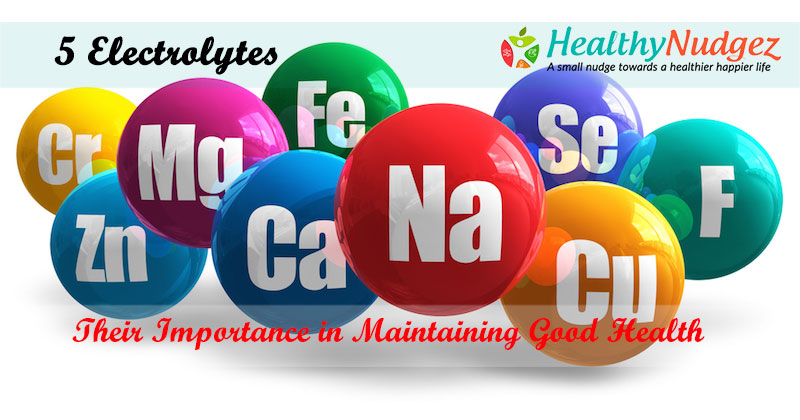5 Electrolytes and their Importance in Maintaining Good Health
Electrolyte levels are mostly determined by food and water consumption so keeping the right balance simply comes down to proper nutrition. Sodium, potassium, magnesium, calcium, and phosphate are the 5 most important electrolytes.
All known higher life forms require a subtle and complex electrolyte balance between the intracellular (inside the cells) and extracellular (outside the cells) environment. This is important to maintain the hydration of the body as well as blood pH.
The heart, muscle and nerve cells use electrolytes to maintain voltages across their cell membranes and to carry electrical impulses across themselves to other cells.
The level of an electrolyte in the blood can become too high or too low. Body electrolyte levels tend to alter when water levels in the body change – when the level of hydration goes up or down.
Electrolyte levels are kept constant by our kidneys and several hormones. To maintain electrolyte concentrations of our body fluids, these electrolytes must be replaced on a regular basis.
An electrolyte imbalance, whether too much or too little, can be quite detrimental to human health. Muscle contraction, for example, requires calcium, potassium and sodium; deficiency of these may result in muscle weakness or severe cramping. Too much sodium, on the other hand, can cause high blood pressure and significantly increase the risk of heart disease.
So, what Are Electrolytes?
An electrolyte is any substance that contains free ions, which means, electrolytes are the substances that dissociate into ions when in a solution (salt in water) and they acquire the capacity to conduct electricity. Sodium, potassium, chloride, magnesium, calcium, and phosphate are examples of electrolytes.
There are several common electrolytes found in the body, each serving a specific and important role, but most are in some part responsible for maintaining the balance of fluids between the intracellular (inside the cell) and extracellular (outside the cell) environments. This balance is critically important for things like hydration, nerve impulses, muscle function, and pH level.
Which are the various important Electrolytes?
Calcium: It is the most abundant electrolyte mineral in human body, and it plays a crucial role in the health of the bones and teeth. Maintaining the proper calcium levels over the course of the lifetime plays an important role in protecting one against osteoporosis. The richest sources include yogurt, collard greens, black-eyed peas and skim milk. Good sources include red meat, chicken and fish. An 8-ounce cup of plain yogurt contains 415 milligrams of calcium, while a cup of soy milk contains 93 milligrams.
Potassium: It helps the body to break down carbohydrates, maintain proper growth and regulate electrical activity of the heart. Potassium is found in a variety of foods: Vegetables such as broccoli, winter squash, tomatoes, lima beans and peas are rich in potassium, dark green leafy. Fruits high in potassium include lemon, bananas, kiwis, cantaloupe, apricots and citrus fruits. Coconut water, all fruit juices, soups and salads are very good sources of potassium.
Magnesium: Good sources include nuts, whole grains, green leafy vegetables, blackstrap molasses and pumpkin and squash seeds.
Phosphorus: Meats and milk products provide the primary sources of phosphorus in diet. Fruits and vegetables contain very little phosphorous.
Sodium: While too much sodium can cause adverse health effects, a small amount of sodium is critical to maintain good health. Sodium helps regulate blood volume and blood pressure. Foods such as milk, beets and celery contain naturally occurring sodium. However, sodium chloride, also known as table salt, is the most common form of sodium. While chloride is found in table salt, it is found naturally in foods such as seaweed, tomatoes, celery, and olives.
Know More – Best Nutritionist in Delhi

